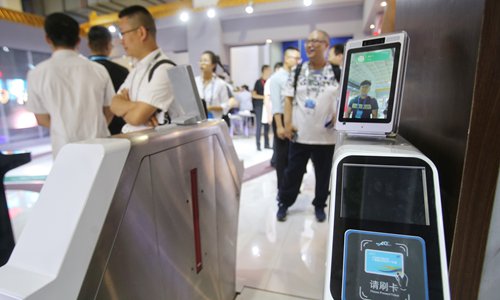HOME >> OPINION
Ideology tints West’s view of China’s technology
By Shen Yi Source:Global Times Published: 2019/11/5 19:32:02

A Beijing subway station tests a facial recognition system on July 25. Photo: IC
The Second China International Import Expo (CIIE) under way in the Chinese metropolis of Shanghai helps uphold the country's global governance concept of "extensive consultation, joint contribution and shared benefits."
Exhibitors have brought their latest products laden with the most advanced technologies, indicating their interest and confidence in the Chinese market that has the potential to lead the world's technological development.
As an emerging tech giant, China has demonstrated that it can be a leading global innovator. The country is making key progress in various sectors including artificial intelligence, facial recognition and big data.
Despite the fact that China's emergence as a high-tech innovator creates potential opportunities for technological cooperation, as the CIIE has showcased, many Western observers take China's use of high-tech to enhance social governance as "surveillance" and "authoritarian" means to tighten up grip on society and limit political openness.
But that is pure hypocrisy. When China was underdeveloped, the West accused the ruling party, the Communist Party of China, of not being democratic. When China has been making enormous economic progress as of now, the West views China through an ideological lens. A notable example is the Western blockade of China telecommunications giant Huawei. They claim that because Huawei is a Chinese company, the government owns users' data and could abuse it.
Take China's social credit system as another example. It aims to promote honesty and acts as a deterrent against dishonest behavior. While subway operators in Beijing plan to install a facial recognition system at stations that is integrated with the social credit system, the move, which aims to speed up security checks and improve the overall security performance of public transportation, was labeled by Western media as having "Orwellian intentions."
What China does and what the West believes China does are often completely different. The discourse systems of China and the West are also poles apart. China used to take Western opinion seriously because the West was leading in many domains. But now facing a narrow-minded West, China should distinguish its well-intended criticism from malicious distortion.
When developing high technologies, both China and the West need to strike a balance among privacy, economic interests and national security.
But what we have seen so far is that the West's understanding of China's development is based on imagination and incorrect knowledge.
The application of high technologies has its boundaries. Data security and privacy issues are what matters in the process. In any scientific field, applications and practices move ahead of theories. China is drawing lessons while trying to apply high technologies in social governance.
China used to look to the West. But when the West cannot offer valuable experience, it is time China take the initiative. China should take the opportunity of being the world's leading technological giant and form its own set of rules in terms of applying high technologies. The rules may also serve as an example for other countries, including Western countries, to develop their high technologies. The West has already fallen behind China in this respect, and if it does not look to China, it will fall behind even further.
The author is director at the Research Center for Cyberspace Governance, Fudan University. opinion@globaltimes.com.cn
RELATED ARTICLES:
Posted in: VIEWPOINT